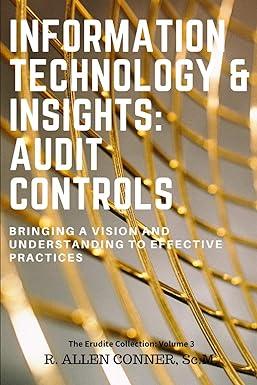Question
X has always worked during his adult years. For the last 20 -years, he has worked in the Finance and Banking law for a major
X has always worked during his adult years. For the last 20 -years, he has worked in the Finance and Banking law for a major law firm Freeheels. X decides to change his career path and now wants to work in taxation law. His employer Freeheels agrees to transfer him to the Taxation Law division but only on strict conditions as the company does not normally allow an established employee lawyer with considerable expertise in an area to change their area of specialty, and effectively start from scratch. One of the conditions is that X must immediately enrol in the Master of Taxation degree at the University of Sydney and that he undertakes four taxation law subjects over the next two years. X agrees. Unfortunately for X , the firm insists that X meets all his own costs of the degree, aside from textbooks. For the income year ending 30 June 2020, the course fees (both courses were undertaken in the last semester 2019 and Semester One, 2020) came to $25,000 and the textbooks came to $1000. Another condition imposed by the firm is that Xs salary will decrease by 20% when he starts in the Tax Division (i.e. Rons salary will drop from $200,000 to $160,000). X started in the Tax division in February 2020. If X should fail any course in his Master of Taxation, he will take a further salary drop of 10%. After two years in the Tax division, Xs salary will return to its normal level (i.e. $200,000).
On 25 May 2020, X presents his receipts for the textbooks he purchased ($1000 to the accounts department of Freeheels, and that department paid the amount ($1000) on the receipts into Xs normal bank account (where salary is deposited).
X also advises that he had $50,000 in net capital losses for the 2018-19 income year (from a sale of shares). These are the only losses available to X.
Advise X on the income tax consequences of the above transactions, events, etc. Your advice must be supported by relevant tax legislation, tax cases and/or tax rulings, tax principles and examples.
Step by Step Solution
There are 3 Steps involved in it
Step: 1

Get Instant Access to Expert-Tailored Solutions
See step-by-step solutions with expert insights and AI powered tools for academic success
Step: 2

Step: 3

Ace Your Homework with AI
Get the answers you need in no time with our AI-driven, step-by-step assistance
Get Started


